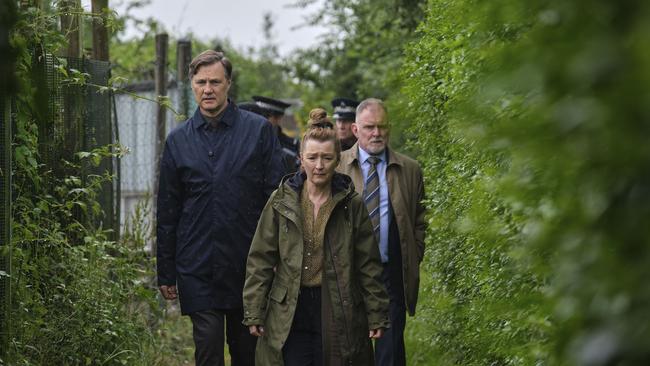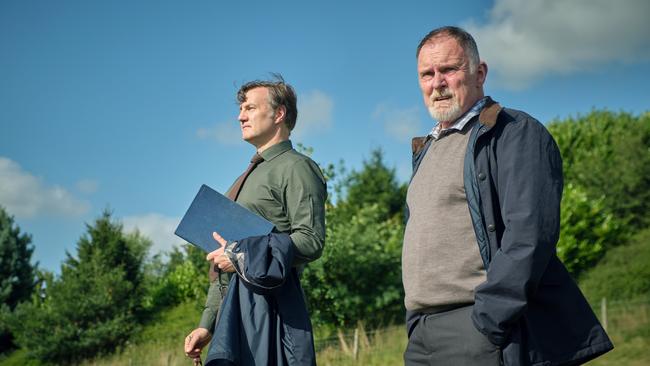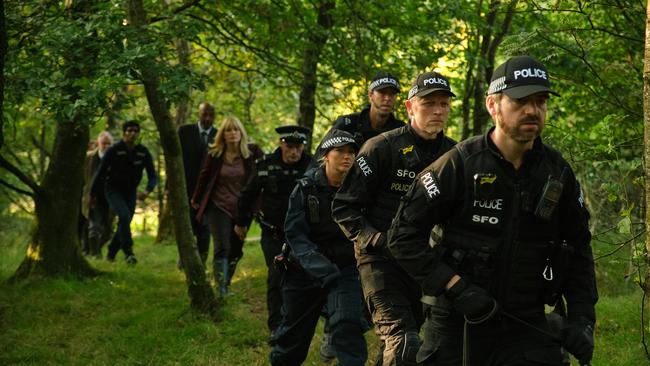Sherwood is an intense character study on how devastating it is to be trapped by the past
Old wounds going back almost 40 years are still festering in a village rocked by a murder in Sherwood, a series inspired by real events.

Sherwood is the latest high-end BBC show to arrive and what a compelling piece of TV it is – a wonderfully realised and sensitively handled hybrid, one not quite fitting any particular genre.
It’s a cop show that’s part mystery, whodunit and true-crime adaptation inspired by real events in Nottinghamshire, while also seeming to offer a state-of-the-nation interpretation – a task more easily said than done and often a matter of conjecture. “The knack of the genre is to find a microcosm symbolic of wider goings-on,” the critic Mark Lawson has suggested. The series seems to have settled on the way that recent British politics has created enemies who will never be forgotten, an intransigence that’s deepening.
Sherwood is an intense character study about the enduring pain caused by long-standing grievances and how personally devastating it is to be trapped by the past, how painful legacies can stop us moving on with our lives, and how we can be trapped by our own histories.
It’s a story that shows how easily lives can turn on quirks of fate, and that no matter how hard you try, you can’t get away from it.
The series is from writer and creator James Graham who also gave us Brexit: The Uncivil War, the brilliant 92-minute film exploring the political campaign behind one of the most contested and controversial government referendums in modern history. It was a crusade that for all its falsehoods and clever disinformation claimed that liberating Britain from the shackles of the EU would enable the nation to reclaim its former glory.
Graham says the history of British politics shows how the forces of polarisation have been weaponised to achieve political ends. And it was this, rather than any desire to create a traditional crime show, that drove him to write this quietly intense six-part drama set in the north Nottinghamshire community in which he grew up.
The background is the miners’ strike of 1984, a turning point in British history. Personal decisions caused divisions in families and communities that remain nearly 40 years later. “A worrying harbinger, perhaps, for families or friends who are still not on speaking terms after the Brexit referendum,” Graham says.
Thatcher’s government was determined to close the collieries and break the miners’ union and the labour movement, opening the way to a free market economy. The full force of the police, the courts and the media were mobilised to defeat the miners, thousands were arrested, fined, imprisoned or sacked, and some never worked again. For those so intimately involved, it often felt like an undeclared civil war.

Graham was also “loosely influenced” by two real-life killings in 2004 where he lived in the former pit village of Annesley Woodhouse. Father of three Keith “Froggy” Frogson was shot with a crossbow arrow on his doorstep by Robert Boyle, who then hacked him to death with a cheap samurai sword and set fire to his house, his victim’s daughter and her husband inside.
Later that month, in an unrelated tragedy, a swaggering bully called Terry Rogers living in his daughter’s home in Huthwaite murdered her with a shotgun. Both killers went into hiding in the same woodland near Annesley Woodhouse. It led to a huge police search, codenamed Operation Rendition, and a police presence in the former mining village as they searched for them.
As Graham says, one of the many tragic consequences brought about by the two real-life killings around his village was that, decades after the strike, those same outside police forces returned to Nottinghamshire – this time to work with the locals to catch two separate suspects of two unrelated killings improbably hiding within the same woods.
And while neither killing was politically motivated or had anything to do with the tensions of the strike, this “didn’t stop the old wounds being exposed, as in the gap between the killings and the capture, speculation mounted that there had been a connection”.
The series is directed with understated skill by Lewis Arnold, best known for his work on the twisty Broadchurch, which so compellingly explored the terrible ramifications of death in a small community, and for Des, that chilling exploration into the motives of Scottish serial killer Dennis Nilsen. More recently there was the intense Jimmy McGovern prison drama Time.
Sherwood begins with a bird’s-eye view of Sherwood Forest, a dense woodland and former royal hunting ground, most commonly known for the legendary outlaw Robin Hood, and for its ancient oaks dating back thousands of years.
The environment constantly encroaches on the story, in a style reminiscent of the critically-acclaimed first season of HBO crime drama True Detective, whose tone was informed by the Louisiana landscape, a place of deserted power plants, desolate burnt-out churches, highly armed drug-running bikers, and isolated communities crawling with religious zealotry. A place where almost nothing or no one is exactly who or what they seem to be.
Arnold uses the dank forest in every possible shot, putting the alienated Nottinghamshire community on the edge of the woodland to provide a further layer of dread and threat.

The lofty scene cuts abruptly to archive footage of the picket lines and the voiceover of Arthur Scargill, the trade unionist who led the miners’ strikes as president of the National Union of Mineworkers. “Are you going to accept it down on your knees?” he shouts. “Or are you going to stand and fight to oppose the closure and butchery of your industry?” Shots of strikers violently clashing with police protecting the so-called “scabs” follow, illustrating the history of the divisions that resonate decades later in Graham’s story.
We’re then quietly introduced to the village community of one-time strikers and non-strikers, the divides and rifts still apparent in their day-to-day lives. Gary Jackson (Alun Armstrong) can’t forget. He’s an ex-miner and National Union of Mineworkers member who refused to cross the picket line, and still calls those he once thought mates scabs for betraying the cause. His wife Julie (Lesley Manville) is still estranged from her sister Cathy (Claire Rushbrook), living nearby, whose husband Fred (Kevin Doyle) didn’t strike.
Then Gary is murdered during the night, left on the road near their home, a crossbow bolt protruding from his chest. Turns out Gary was arrested for arson with four others back in 1984 but the charges were mysteriously dropped after an “intervention” by a senior Met officer, with paragraphs of the charge sheet heavily redacted.
The investigation of his death falls to Detective Chief Superintendent Ian St Clair (David Morrissey), a high-ranking Nottingham cop, recently honoured for tackling street crime and gang violence in the city. He’s forced to reunite with the DI Kevin Salisbury (Robert Glenister) from London’s Metropolitan Police to solve the murders, and there’s clearly some history between them. Both seem to have personal links to the past riots, but while St Clair seems deeply moral and rather rigorous, Salisbury is a loose cannon, his life a mess, facing disciplinary action for assaulting an officer for a racist comment.
It’s a beautifully set up first episode. Characters are carefully established and inhabited by a first-class group of British actors, who are convincing and authentic. And Arnold’s direction is tautly understated, serving the details of Graham’s tight storytelling. He moves his camera to underscore the emotional currents and to reduce editing within a scene. Every cut, music cue and bit of dialogue contributes to the sense that the show has a grand design, that all things in this story happen for a reason.
There are several suspects with the will and motive to commit murder, along with the still sorely felt divides and enmities that exist in this community. But there’s more, with suggestions of special branch deception in the past. Is Gary’s demise linked somehow to the events of that picket line in 1984?
Graham refers to “the delicate elements of community and the impact on people’s lives and their psychology and their spirit”. It’s going to be fascinating to discover, as the cat-and-mouse chase into the forest unfolds, just how it all plays out.
Sherwood, Thursday, 8.30pm, BBC First.




To join the conversation, please log in. Don't have an account? Register
Join the conversation, you are commenting as Logout